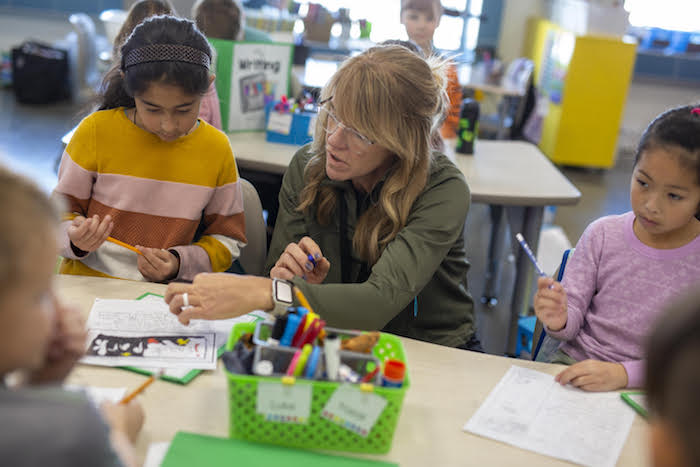Education
Our Kids Are Struggling To Read. Phonics Is The Easy Fix

From the Frontier Centre for Public Policy
One Manitoba school division is proving phonics works
If students don’t learn how to read in school, not much else that happens there is going to matter.
This might be a harsh way of putting it, but it’s the truth. Being unable to read makes it nearly impossible to function in society. Reading is foundational to everything, even mathematics.
That’s why Canadians across the country should be paying attention to what’s happening in Manitoba’s Evergreen School Division. Located in the Interlake region, including communities like Gimli, Arborg and Winnipeg Beach, Evergreen has completely overhauled its approach to reading instruction—and the early results are promising.
Instead of continuing with costly and ineffective methods like Reading Recovery and balanced literacy, Evergreen has adopted a structured literacy approach, putting phonics back at the centre of reading instruction.
Direct and explicit phonics instruction teaches students how to sound out the letters in words. Rather than guessing words from pictures or context, children are taught to decode the language itself. It’s simple, evidence-based, and long overdue.
In just one year, Evergreen schools saw measurable gains. A research firm evaluating the program found that five per cent more kindergarten to Grade 6 students were reading at grade level than the previous year. For a single year of change, that’s a significant improvement.
This should not be surprising. The science behind phonics instruction has been clear for decades. In the 1960s, Dr. Jeanne Chall, director of the Harvard Reading Laboratory, conducted extensive research into reading methods and concluded that systematic phonics instruction produces the strongest results.
Today, this evidence-based method is often referred to as the “science of reading” because the evidence overwhelmingly supports its effectiveness. While debates continue in many areas of education, this one is largely settled. Students need to be explicitly taught how to read using phonics—and the earlier, the better.
Yet Evergreen stands nearly alone. Manitoba’s Department of Education does not mandate phonics in its public schools. In fact, it largely avoids taking a stance on the issue at all. This silence is a disservice to students—and it’s a missed opportunity for genuine reform.
At the recent Manitoba School Boards Association convention, Evergreen trustees succeeded in passing an emergency motion calling on the association to lobby education faculties to ensure that new teachers are trained in systematic phonics instruction. It’s a critical first step—and one that should be replicated in every province.
It’s a travesty that the most effective reading method isn’t even taught in many teacher education programs. If new teachers aren’t trained in phonics, they’ll struggle to teach their students how to read—and the cycle of failure will continue.
Imagine what could happen if every province implemented structured literacy from the start of Grade 1. Students would become strong readers earlier, be better equipped for all other subjects, and experience greater success throughout school. Early literacy is a foundation for lifelong learning.
Evergreen School Division deserves credit for following the evidence and prioritizing real results over educational trends. But it shouldn’t be alone in this.
If provinces across Canada want to raise literacy rates and give every child a fair shot at academic success, they need to follow Evergreen’s lead—and they need to do it now.
All students deserve to learn how to read.
Michael Zwaagstra is a public high school teacher and a senior fellow at the Frontier Centre for Public Policy.
Alberta
Education negotiations update: Minister Horner

President of Treasury Board and Minister of Finance Nate Horner issued the following statement about the ongoing negotiations with TEBA and the ATA:
“I am pleased to share that TEBA and the ATA met in an Alberta Labour Relations Board (LRB) resolution conference today to discuss the unfair labour practice complaint launched against the ATA, by TEBA.
“As a result of the resolution conference, the LRB issued a consent order, which is an agreement by the parties to resolve the complaint.
“The consent order clarifies that there are only three outstanding bargaining issues. They are:
- The timing for implementation of the unified grid;
- The ATA’s proposal for an annual 1.5% long service allowance for teachers at the maximum step of the grid; and,
- Coverage of the COVID-19 vaccination.
“This consent order makes clear that none of the outstanding items under negotiation are about classroom complexity, class size or support for students.
“Alberta’s government has already addressed these concerns though our current offer which would add 3000 more teachers to classrooms. In addition, Budget 2025 invested$1.6 billion to support diverse learning needs and complexity in classrooms. This includes $53 million for classroom complexity grants.
“I trust that this order will assist Alberta’s families and teachers in understanding the true nature of the ongoing negotiations.”
Business
The Real Reason Tuition Keeps Going Up at Canada’s Universities

Since 2020, steep increases to tuition fees have triggered large-scale protests by the students who pay those fees at the University of Alberta, University of Calgary, University of British Columbia and at McGill University and Concordia University in Quebec, among many other schools. (A freeze on tuition fees in Ontario since 2019 explains that province’s absence from the list.)
It’s true that tuition has been on the rise. According to Statistics Canada , between 2006-2007 and 2024-2025, the average undergraduate full-year tuition fee at a Canadian university grew from approximately $4,900 to $7,360.
But do the students really know what’s behind the increases?
University administrators looking to deflect responsibility like to blame provincial government cutbacks to post-secondary funding. Here, the evidence is unconvincing. Going back two decades, nationwide full-time equivalent (FTE) student transfer payments from provincial governments have remained essentially constant, after accounting for inflation. While government grants have remained flat, tuition fees are up.
The issue, then, is where all this extra money is going – and whether it benefits students. Last year researcher and consultant Alex Usher took a close look at the budgeting preferences of universities on a nationwide basis. He found that between 2016-2017 and 2021-2022 the spending category of “Administration” – which comprises the non-teaching, bureaucratic operations of a university – grew by 15 percent. Curiously enough “Instruction,” the component of a university that most people would consider to be its core function, was among the slowest growing categories, at a mere 3 percent. This top-heavy tendency for universities is widely known as “administrative bloat”.
Administrative bloat has been a problem at Canadian universities for decades and the topic of much debate on campus. In 2001, for example, the average top-tier university in Canada spent $44 million (in 2019 dollars) on central administration. By 2019 this had more than doubled to $93 million, supporting Usher’s shorter-term observations. Usher calculated that the size of the non-academic cohort at universities has increased by between 85 percent and 170 percent over the past 20 years.
While some level of administration is obviously necessary to operate any post-secondary institution, the current scale and role of campus bureaucracies is fundamentally different from the experience of past decades. The ranks of university administration used to be filled largely with tenured professors who would return to teaching after a few terms of service. Today, the administrative ranks are largely comprised of a professional cadre of bureaucrats. (They are higher paid too; teaching faculty are currently paid about 10 percent less than non-academic personnel.)
This ever-larger administrative state is increasingly displacing the university’s core academic function. As law professor Todd Zywicki notes, “Even as the army of bureaucrats has grown like kudzu over traditional ivy walls, full-time faculty are increasingly being displaced by adjunct professors and other part-time professors who are taking on a greater share of teaching responsibilities than in the past.” While Zywicki is writing about the American experience, his observations hold equally well for Canada.
So while tuition fees keep going up, this doesn’t necessarily benefit the students paying those higher fees. American research shows spending on administration and student fees are not correlated with higher graduation rates. Canada’s huge multi-decade run-up in administrative expenditures is at best doing nothing and at worst harming our universities’ performance and reputations. Of Canada’s 15 leading research universities, 13 have fallen in the global Quality School rankings since 2010. It seems a troubling trend.
And no discussion of administrative bloat today can ignore the elephant in the corner: diversity, equity and inclusion (DEI). Writing in the National Post, Peter MacKinnon, past president of the University of Saskatchewan, draws a straight line from administrative bloat to the current infestation of DEI policies on Canadian campuses.
The same thing is going on at universities across Canada that have permanent DEI offices and bureaucracies, including at UBC, the University of Calgary, University of Waterloo, Western University, Dalhousie University and Thompson Rivers University. As a C2C Journal article explains, DEI offices and programs offer no meaningful benefit to student success or the broader university community. Rather, they damage a school’s reputation by shifting focus away from credible scientific pursuits to identity politics and victimology.
With universities apparently unable to restrain the growth of their administrative Leviathan, there may be little alternative but to impose discipline from the outside. This should begin with greater transparency.
Former university administrator William Doswell Smith highlights a “Golden Rule” for universities and other non-profit institutions: that fixed costs (such as central administration) must never be allowed to rise faster than variable costs (those related to the student population). As an example of what can happen when Smith’s Golden Rule is ignored, consider the fate of Laurentian University in Sudbury, Ontario.
In early 2021 Laurentian announced it was seeking bankruptcy protection under the Companies’ Creditors Arrangement Act, under which a court-appointed manager directs the operations of the delinquent organization. Laurentian then eliminated 76 academic programs, terminated 195 staff and faculty, and ended its relationships with three nearby schools.
Ontario’s Auditor-General Bonnie Lysak found that the primary cause of the school’s financial crisis were ill-considered capital investments. The administrators’ big dreams essentially bankrupted the university.
The lesson is clear: if universities refuse to correct the out-of-control growth of their administrations, then fiscal discipline will eventually be forced upon them. A reckoning is coming for these bloated, profligate schools. The solution to higher tuition is not increasing funding. It’s fewer administrators.
The original, full-length version of this article was recently published in C2C Journal.
Jonathan Barazzutti is an economics student at the University of Calgary. He was the winner of the 2nd Annual Patricia Trottier and Gwyn Morgan Student Essay Contest co-sponsored by C2C Journal.
-

 Business2 days ago
Business2 days agoCarney Admits Deficit Will Top $61.9 Billion, Unveils New Housing Bureaucracy
-

 Alberta1 day ago
Alberta1 day agoAlberta first to add citizenship to licenses
-

 Alberta1 day ago
Alberta1 day agoBreak the Fences, Keep the Frontier
-

 Business11 hours ago
Business11 hours agoCarney’s ‘major projects’ list no cause for celebration
-

 Business10 hours ago
Business10 hours agoRed tape is killing Canadian housing affordability
-

 Business1 day ago
Business1 day agoCarney’s Ethics Test: Opposition MP’s To Challenge Prime Minister’s Financial Ties to China
-

 Business12 hours ago
Business12 hours agoGlobal elites insisting on digital currency to phase out cash
-

 Business1 day ago
Business1 day agoAttrition doesn’t go far enough, taxpayers need real cuts

